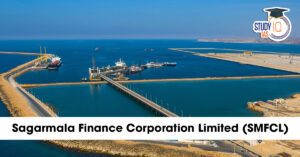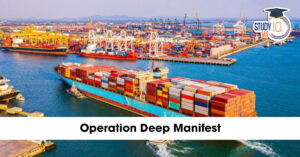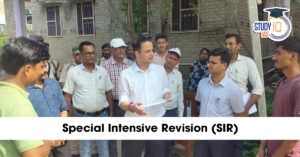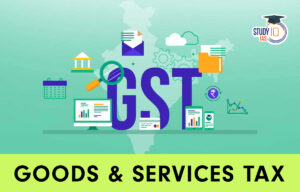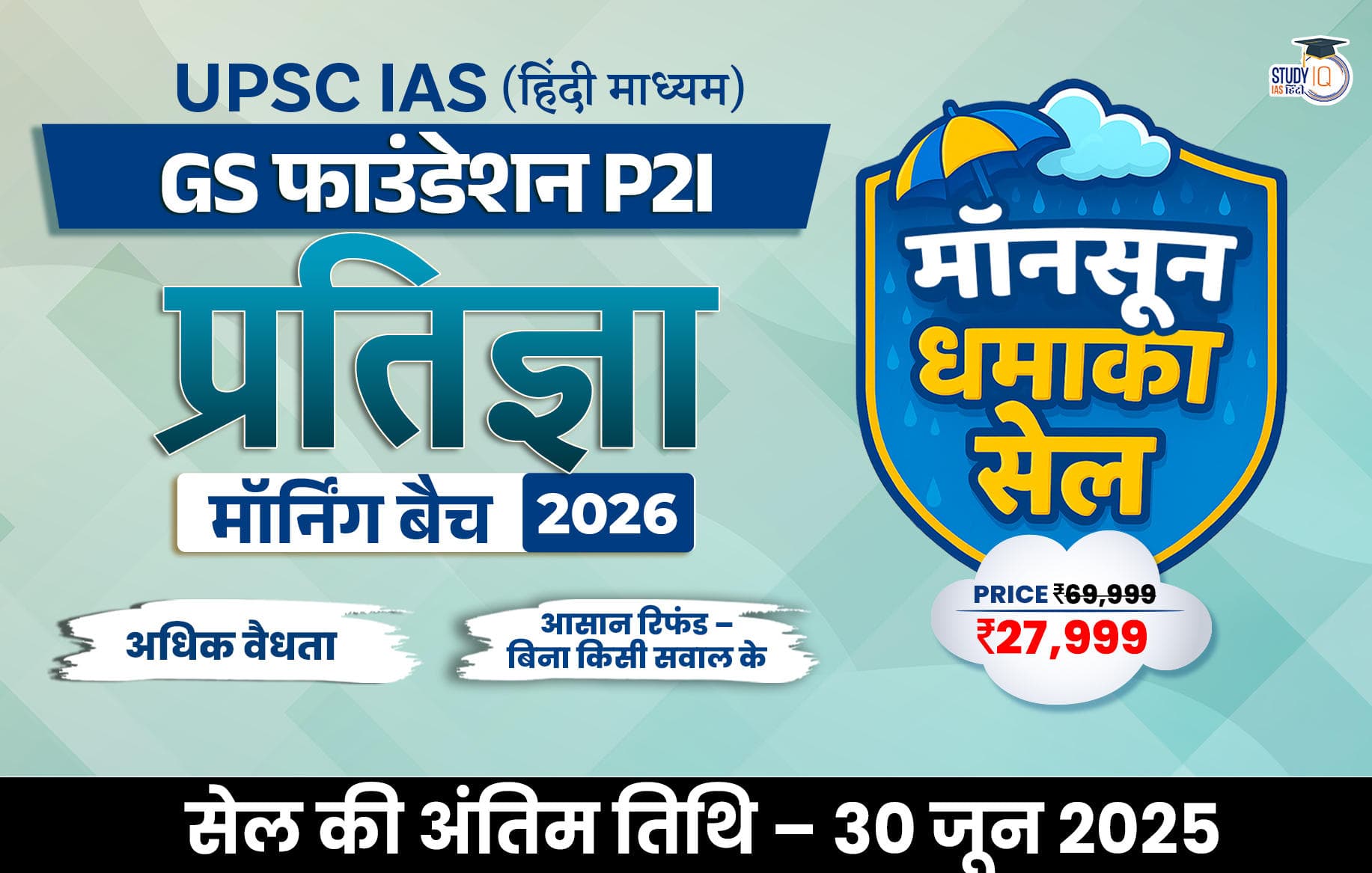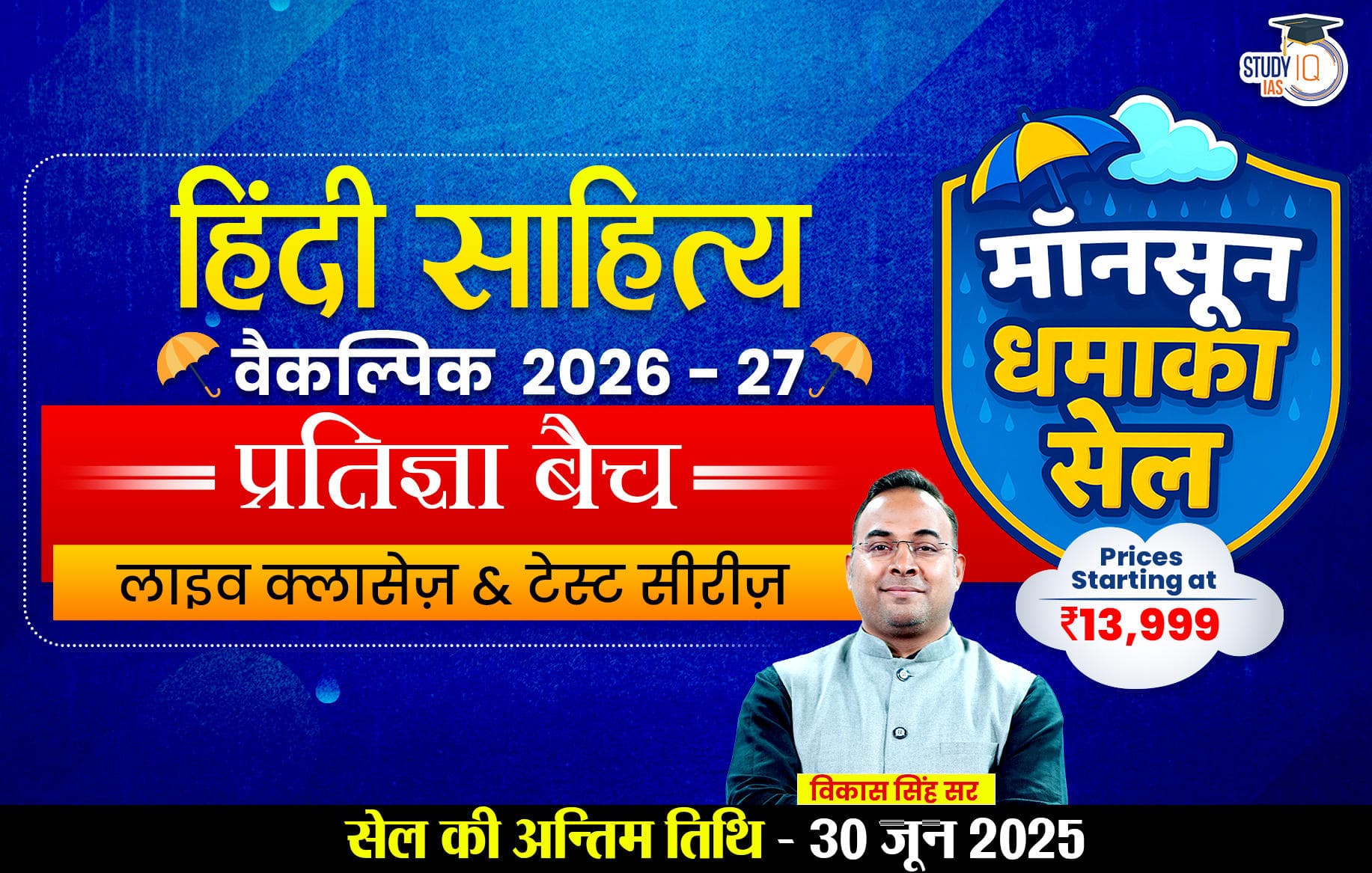StudyIQ is India’s Best Website for UPSC, State PSC, and Judiciary exam preparation. We offer a wide array of resources designed to help aspirants succeed in these highly competitive exams. Our platform provides UPSC Online Coaching, Daily Current Affairs, Government Schemes Updates, General Knowledge Updates, and State PSC Updates, ensuring that you stay well-informed and prepared at all times.
We cover a diverse range of subjects, including History Updates, Geography Updates, Indian Polity Updates, Environment Updates, Science Tech Updates, Economy Updates, and Art and Culture Updates. Our Biography Updates help you learn about influential figures that are often tested in various exams.
Trending Posts
- China, Pakistan and Bangladesh Trilateral Meeting – India’s New ChallengeJuly 1, 2025Context: China recently hosted the first trilateral meeting with Pakistan and Bangladesh in Kunming, a gathering seen ...
- US Pulls Funding from GAVI-Global Vaccine AllianceJuly 1, 2025Context: The U.S. has pulled funding from Gavi, the global vaccine alliance, under Health Secretary Robert F. ...
- Sagarmala Finance Corporation Limited (SMFCL): Objectives and FunctionsJuly 1, 2025Context: Sagarmala Finance Corporation Limited (SMFCL) has been established as India’s first maritime sector-specific Non-Banking Financial Company ...
- Operation Deep Manifest, Key Features and SignificanceJuly 1, 2025Context: Under ‘Operation Deep Manifest’, the Directorate of Revenue Intelligence (DRI) has seized goods of Pakistani origin ...
- Tigers Outside Tiger Reserves (TOTR) SchemeJuly 1, 2025Context: The Union Environment Ministry has approved funding for the ‘Tigers Outside Tiger Reserves’ (TOTR) pilot scheme, ...
- Small Savings Schemes: Possible Interest Rate Cuts AheadJuly 1, 2025The Ministry of Finance has announced that interest rates for all small savings schemes, including the Public ...
- Special Intensive Revision (SIR) of Electoral RollsJuly 1, 2025Context: ECI has launched a Special Intensive Revision in Bihar, requiring all voters to submit forms and ...
- Desert Climate, Distribution, Climatic Conditions & MapJuly 1, 2025Deserts are among the most extreme and fascinating ecosystems on Earth. Characterized by scarce rainfall and extreme ...
- Goods and Services Tax (GST), Objectives, Features, Subsumed TaxesJuly 1, 2025India celebrates the eighth anniversary of the Goods and Services Tax (GST) on July 1, 2025, marking ...
Government Schemes
- Tigers Outside Tiger Reserves (TOTR) Scheme
- Small Savings Schemes: Possible Interest Rate Cuts Ahead
- 10 Years of AMRUT Scheme: Objectives, Key Features and Focus Areas
- NAVYA Initiative, Key Features, Implementation and Significance
- e-Rakt Kosh Platform: Purpose and Key Features
- Ministry of Education Released Performance Grading Index (PGI) 2.0 Report
History
- Maharashtra’s Mendrachi Vancharai System
- Keeladi Excavation: Uncovering the Ancient Tamil Civilization
- Sanyasi Revolt, Objectives, History, Reason and Important Leaders
- Indus Valley Civilization, History, Phases, Script and Significance
- Pandyan Dynasty, Administration and Social and Political Aspects
- Regulating Act of 1773: Background, Provisions, Significance & Drawbacks
Geography
- Desert Climate, Distribution, Climatic Conditions & Map
- Largest Desert in the World, Check Name, Location, Type, Area
- Deserts of India Map, Features of Thar Desert & Cold Desert of India
- Places in News for UPSC 2025 for Prelims and Mains Exam
- Evaporative Demand: Main Drivers and its Environmental Impact
- Summer Solstice, Definition, Reason and Significance
Indian Polity
- India Mediation Campaign, Objectives, Process and Significance
- Emergency Provisions in Indian Constitution: Types and Significance
- Directive Principles of State Policy (DPSP) Meaning, Articles, Features, Importance
- National Company Law Appellate Tribunal (NCLAT)
- Judges Joining Politics: Constitutional Restrictions, Concerns and Examples
- President’s Rule in India, Article 356, Grounds of Declaration
Environment
- Salkhan Fossil Park Joins UNESCO’s Tentative List of World Heritage Sites
- Forest Conservation Act 1980, Objectives, Features, Amendments
- Rinderpest: Causes, Transmission, Symptoms and RHF Designation
- Russell’s Viper: Features, Habitat and Conservation Status
- Gharial: Characteristics, Habitat and Conservation Status
- International Big Cat Alliance (IBCA), Objectives and Significance
Economy
- Sagarmala Finance Corporation Limited (SMFCL): Objectives and Functions
- Operation Deep Manifest, Key Features and Significance
- Goods and Services Tax (GST), Objectives, Features, Subsumed Taxes
- Poverty in India, Types, Causes and Government Initiatives
- Coffee Plantation in India, Major Regions and India’s Robusta Beans Export
- Food and Fertiliser Subsidies in India, Need and Issues
Biography
- Tansen Biography, Musical Legacy and Master of Dhrupad
- Sree Narayana Guru (1856–1928), Key Movements and Literary Works
- Mangal Pandey Biography, History and Role in Revolt of 1857
- Dr. Shyama Prasad Mukherjee Biography, Legacy, and Contributions to Indian Politics
- Meet Saraswathi Rajamani: India’s First Female Spy during Freedom Struggle
- Ahilya Bai Holkar Biography, Key Contributions and Legacy
Best UPSC IAS Preparation Website 2025
The objective of the StudyIQ is to provide every student across the country with affordable resources that can help them in their preparation for UPSC, State PSC and Judiciary exams.
StudyIQ covers all the recruitment information from the start till the end. After the release of the notification of the exam, we cover the detailed information that a candidate wants to know about a particular recruitment, such as the notification, important exam dates, vacancy details, eligibility criteria, exam pattern, syllabus, and educational qualifications. We also provide you with a direct link to download the notification PDF directly and steps to download or apply for the particular examination from the respective official website.
StudyIQ provided appropriate study material with the test series, book kit, mock test, previous years’ question papers with solutions, cut off, and daily MCQs. We provide you with vast knowledge of all subjects required for examination, section-wise knowledge, and also videos on the daily relevant current affairs topics on our StudyIQ YouTube platform.
Our test series, daily study notes/PDF, and mock tests help candidates prepare themselves on a daily basis for the UPSC, State PSC, and Judiciary examinations. This will help candidates increase their speed and Accuracy without going to any of the big cities for preparation.
Candidates can attempt proper section-wise mock tests for all topics at their home comfort zone. We also provide daily MCQs for a particular topic of the subject.
As we see there are ample amounts of study materials available in the market that sometimes dilute the focus of the candidates from the focused area. So, the StudyIQ team provides you with all relevant information in one place in a systematic way that can help you figure out the strategy and planning to complete their syllabus in a timely manner.
Best Website for UPSC Preparation 2025
The Union Public Service Commission conducts the UPSC CSE exam every year for the recruitment of various vacancies for the various posts of Group A and Group B under the central government. UPSC Civil Service 2025 is the biggest and most prestigious government examination. StudyIQ provides you with detailed information regarding the notification, exam pattern, eligibility criteria, important dates and syllabus, and Results.
Best UPSC Civil Service Preparation Website FAQs
Q. How do I start my UPSC preparation?
Ans. Candidates can start their UPSC preparation from the StudyIQ platform in a systematic way where you can find Daily Current Affairs, Burning Issues, Hindu Analysis, PIB Analysis and many more.
Q. How to cover current affairs when the IAS preparation syllabus is so vast?
Ans. Current Affairs for the IAS preparation is a very important part for which you can refer the StudyIQ’s Daily Current Affairs news Analysis and monthly magazine.
Q. Is self-preparation for the IAS exam enough to clear it?
Ans. Self-preparation for the IAS exam is a good choice but you need to start preparation in an organized manner with relevant study materials and proper strategy for which the StudyIQ platform can play an important role to provide all the UPSC-related materials and guidance at a place.
Q. Where to download UPSC study materials/IAS study material PDF?
Ans. Candidates can easily download UPSC study materials/IAS study material PDFs from India’s best UPSC platform StudyIQ.
Q. What are the Study Materials for GS preparation for IAS?
Ans. The Study Materials for GS preparation for the IAS exam include mainly NCERT from classes 6th to 12th, Daily Current Affairs & News analysis integrate with the static part and also refer to StudyIQ’s reference books such as Indian Geography, Indian Polity, Indian Economy, Indian Art & Culture and Fundamentals of Geography.
Q. Which website is best for the UPSC IAS exam preparation?
Ans. StudyIQ is the best platform for every aspect of the UPSC IAS exam preparation from scratch.




